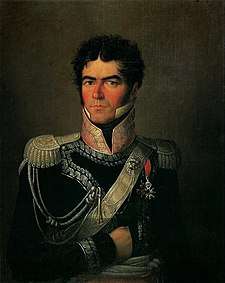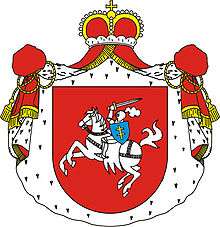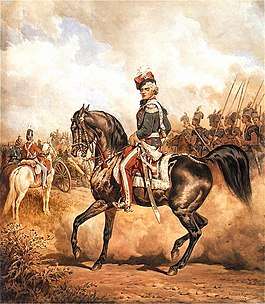Eustachy Erazm Sanguszko
Prince Eustachy Erazm Sanguszko (1768–1844) was a Polish nobleman, general, military commander, diplomat and politician.
Eustachy Erazm Sanguszko | |
|---|---|
| Prince | |
  | |
| Coat of arms | Pogoń Litewska coat of arms |
| Born | October 26, 1768 Radzyń Podlaski |
| Died | December 2, 1844 (aged 76) Sławuta |
| Family | Sanguszko |
| Consort | Klementyna Czartoryska |
| Issue | |
| Father | Hieronim Janusz Sanguszko |
| Mother | Cecylia Urszula Potocka |

Life
He was a deputy in the Great Sejm 1788–1792, the parliament which produced the 3 May Constitution. Sanguszko then participated in the Polish-Russian War of 1792 where he fought at the Battle of Zieleńce as a cavalry brigadier. During the Kościuszko Uprising in 1794 he was a major general and a divisional commander. At the Battle of Szczekociny he saved Kościuszko's life. Then during the siege of Warsaw he was wounded. He was a member of the general staff of Napoleon Bonaparte during the Russian campaign (with the rank of brigadier general) and took part in the march on Moscow. In the Duchy of Warsaw he was the vice-Regimentarz of the pospolite ruszenie (general call-up). To protect family land holdings in the Ukraine Sanguszko refused to participate in Prince Poniatowski's 1813 campaign, for which the commander-in-chief, an old friend, punished him harshly with a dishonourable discharge from the army. After the fall of Napoleon, Sanguszko settled on his ancestral lands that included the battlefield of Zieleńce. There he often pondered on past historic events in which he took part and described his thoughts in his "Memoirs".[1] Between 1817–1820 he was the governor marshal of Volhynia. He was decorated with the Polish Knight's Cross of the Virtuti Militari and Chevalier of the French Legion of Honour.
On June 26, 1798 in Sławuta, he married Klementyna Czartoryska with whom he had three children: Dorota (1799-1831), Roman (1800-81), and Władysław (1803-70). Earlier on he had been romantically involved with Julia Lubomirska.[2]
See also
References
- Memoirs: Wykaz doswiadczen przez ojca dla dzieci w roku 1815 spisany (published 1876 with the title Pamiętnik 1786-1815).
Footnotes
- Memoirs
- Marszalska, J. M. (1998). Eustachy Erazm Sanguszko i Julia z Lubomirskich Potocka na tle wydarzeń 1794 roku. Tarniny.